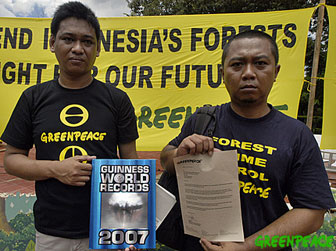Indonesia to be recognized in Guinness Book of World Records for deforestation rate
Indonesia to be recognized in Guinness Book of World Records for deforestation rate
mongabay.com
May 4, 2007
Greenpeace is using an novel marketing ploy to raise awareness about forest loss in Indonesia: the Guinness Book of World Records. The green group has convinced the publisher of to recognize Indonesia as the “country with the fastest rate of forest destruction on the planet.”
According to Greenpeace, the text will read:
“Of the 44 countries which collectively account for 90% of the world’s forests, the country which pursues the world’s highest annual rate of deforestation is Indonesia with 1.8 million ha (4,447,896 acres) per year between 2000-2005 – a rate of 2 per cent annually or 51 square km (20 square miles) every day.”
Hapsoro, an Indonesian Greenpeace forest campaigner, said “It is a national shame for Indonesia to own this distinction in the record books. These record rates of destruction make Indonesia not only the fastest forest destroyer but also the world’s number one greenhouse gas polluter from deforestation.”
 |
Indonesia’s high rate of forest loss is largely the result of poor forest management and corruption. Each year thousands of hectares are illegally logged for timber and burned to establish oil palm plantations.
Greenpeace has used the “award” tactic in the past, notably with the “Golden Chainsaw” prize, which was awarded in 2005 to Blairo Maggi, Governor of the State of Mato Grosso. At the time Maggi, known as the “King of Soy”, was one of the largest destroyers of the Amazon rainforest.
Indonesia will be officially be awarded its “highest deforestation” title in the 2008 edition of the Guinness Book of World Records. Greenpeace made the announcement as the Intergovernmental Panel on Climate Change (IPCC) was meeting in Bangkok to discuss ways to cut carbon dioxide emissions. One of the proposals on the table considers compensating tropical countries, like Indonesia, for conserving their forests. Tropical forests lock up large amounts of carbon, helping to mitigate global warming.
Related articles